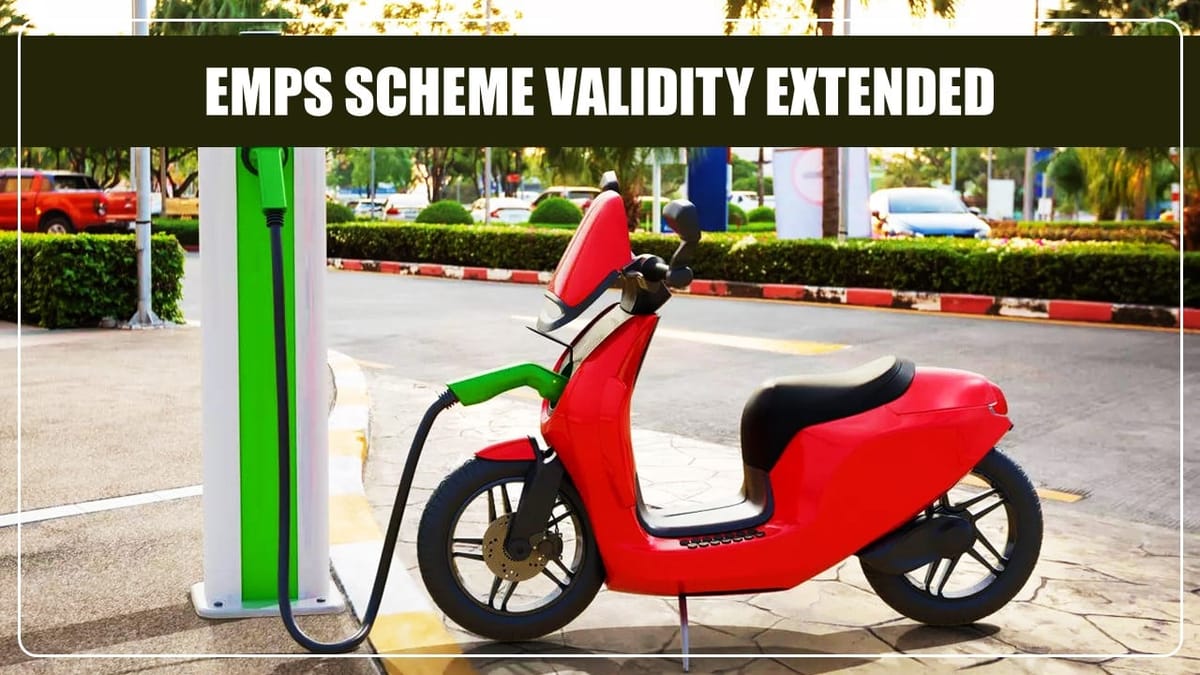Reetu | Jul 27, 2024 |

Govt extends validity of EMPS Scheme for Electric 2-wheeler Buyers
The Central Government extended the validity of the Electric Mobility Promotion Scheme (EMPS) 2024 by two months, from July 31 to September 30 on Friday. The scheme’s budget has also been increased to Rs.778 crore from the initial Rs.500 crore set aside for subsidizing the sale of electric two and three-wheelers, according to an official release.
The Electric Mobility Promotion Scheme 2024 (EMPS 2024), launched by the Ministry of Heavy Industries, Government of India through gazette notification 1334 (E) dated March 13, 2024, aims to boost the adoption of electric vehicles (EVs) across the country. It aims to enhance the Indian government’s green initiatives while also fostering the expansion of the country’s electric vehicle (EV) manufacturing ecosystem.
The EMPS Scheme was originally scheduled to run from April 1, 2024, to the end of July. Under the initiative, electric vehicle (EV) customers can receive a subsidy of up to Rs.10,000 per two-wheeler and Rs.50,000 per three-wheeler. Companies sell locally produced automobiles at a discount to consumers, then claim subsidies from the Ministry of Heavy Industries.
EMPS was established to continue boosting sales of clean energy vehicles when the Faster Adoption and Manufacturing of Electric Vehicles (FAME) subsidy scheme expired on March 31, 2024.
The scheme’s target number of EVs has also been increased to 5.61 lakh from the initial 3.72 lakh. The updated targets include 500,080 electric two-wheelers (e-2Ws) and 60,709 electric three-wheelers (e-3Ws), the press release stated. This comprises 13,590 rickshaws, e-carts, and 47,119 e-3Ws in the L5 category. To promote innovative technology, incentives will only be offered for EVs with advanced batteries. The scheme has a fixed budget, and the quantity of EVs is limited to the numbers specified for each designated category.
The centre is confident that it will meet its EMPS targets thanks to strong EV sales. Hero Motocorp, Bajaj, TVS, Ather, Ola, and Kinetic Green are among the EV manufacturers that have received clearance to sell vehicles and collect EMPS subsidies.
The FAME Scheme included a phased manufacturing programme (PMP), which allowed EV manufacturers to import components until eventually obtaining them locally. This has been replaced by stronger compliance with localization since the first day of the EMPS, and it is expected to continue in the following scheme.
The FAME Scheme was introduced in 2015 at a cost of Rs.5,172 crore. FAME II was launched in 2019 with a budget of Rs.10,000 crore and lasted five years.
The Scheme fosters an efficient, competitive, and resilient EV manufacturing industry in the country, hence advancing the Prime Minister’s vision of Aatmanirbhar Bharat. For this reason, the Phased Production Programme (PMP) has been implemented, which promotes domestic production and strengthens the off-EV supply chain. This will also generate major employment possibilities throughout the value chain.
In case of any Doubt regarding Membership you can mail us at [email protected]
Join Studycafe's WhatsApp Group or Telegram Channel for Latest Updates on Government Job, Sarkari Naukri, Private Jobs, Income Tax, GST, Companies Act, Judgements and CA, CS, ICWA, and MUCH MORE!"